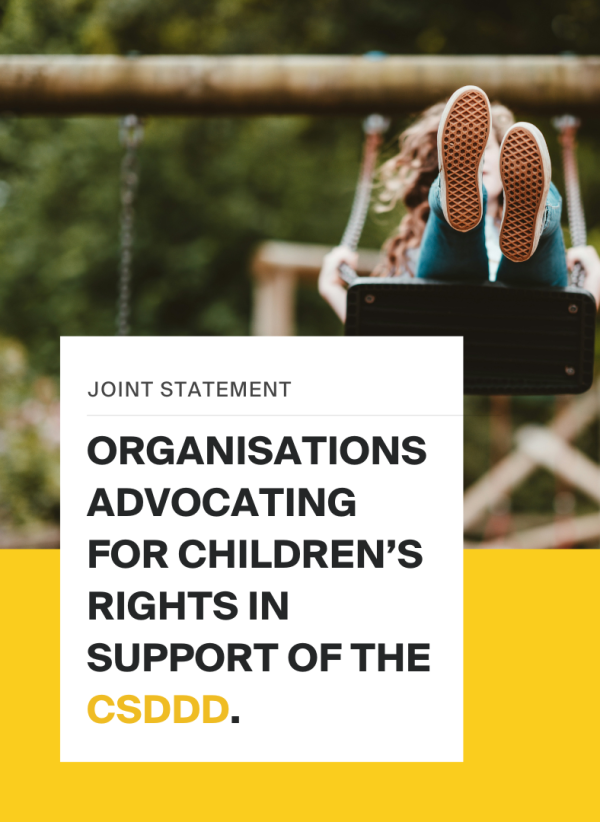This website uses cookies so that we can provide you with the best user experience possible. Cookie information is stored in your browser and performs functions such as recognising you when you return to our website and helping our team to understand which sections of the website you find most interesting and useful.

Brussels, 23 February 2022 – Today’s proposal by the European Commission to minimise business’ destructive impact on workers, communities, and the environment is a turning point in the battle to end corporate impunity, but is riddled with flaws and exemptions, warned the European Coalition for Corporate Justice.
ECCJ director Claudia Saller said: “Companies are increasingly under pressure to take their social and environmental duties seriously. But many hide behind their complex supply chains to avoid accountability and dodge difficult questions. The Commission’s proposal is the first EU initiative of its kind and that in itself is ground-breaking, but it fails to deliver on the potential.”
The draft law would, for the first time, require EU companies with more than 500 employees and turnover of €150 million to prevent human rights and environmental abuses along their full supply chains, by carrying out so-called ‘due diligence’. In industries where the risk of exploitation is higher like agriculture and fashion, only companies with more than 250 employees and turnover of €40 million would be covered, while SMEs would be exempt. Non-EU companies in the single market that exceed these turnover thresholds would also be covered.
This limitation means the draft legislation only applies to less than 0.2% of EU companies. By restricting the scope so dramatically, the proposal wilfully ignores many harmful business operations, as staff size and annual turnover are not reliable indicators of how a company is impacting the lives of workers and communities worldwide.
Under the new law, companies could be held liable for harms committed at home or abroad by their subsidiaries, contractors and suppliers, and their victims will have the opportunity to file lawsuits before EU courts. This is an important step that creates a right to remedy for people affected by corporate malpractice.
However, a dangerous loophole risks making the law ineffective in preventing harm beyond the first tier of the supply chain – and impeding victims from holding companies liable. The text implies that companies could fulfil their obligations by adding certain clauses in their contracts with suppliers and offloading the verification process to third parties. Companies should not be allowed to shift their responsibilities on to their suppliers or to get away with harm by participating in voluntary industry schemes.
The draft law also does nothing to strike down serious legal hurdles in bringing transnational cases against companies – such as high costs, short time limits, limited access to evidence, restricted legal standing, and a disproportionate burden of proof.
ECCJ director Claudia Saller said: “The Commission’s draft law promises a new path to justice and compensation for exploited, traumatised and injured workers and communities. But it ignores serious legal hurdles that make lawsuits costly, lengthy, and complicated. That is why the future law must be victim-based. If the law doesn’t make it easier for victims to hold businesses accountable, then it is unlikely to make very much difference. And this lack of accountability will perpetuate some of the most pressing issues in the world today, like child labour, pollution and the destruction of nature.”
The proposed directive includes other important elements, such as setting up new supervisory authorities in EU member states to issue orders and impose dissuasive sanctions. When applying for public contracts, companies will have to prove they have not been sanctioned for due diligence breaches.
The Commission wants companies to adopt a climate transition plan in line with the 1.5 degree target of the Paris climate agreement. However, the proposal does not foresee any specific consequences for the breach of this climate duty, which risks making it ineffective.
Company directors will have to integrate human rights, the environment, and the climate into their decisions and oversee due diligence actions. Other governance rules previously considered by the Commission have been scrapped following fierce lobbying by industry groups.
ECCJ director Claudia Saller said: “More than half a million citizens and 700 civil society groups and trade unions asked the EU for a law that would take forced labour, factory fires and oil spills out of our shopping baskets once and for all. It seems like the Commission has heard us – but only with one ear. We could be at a real turning point in the battle to end corporate impunity, but serious gaps need to be closed.”
The Commission proposal will be subject to amendments and approval by the European Parliament and governments over the coming months and years.
Parallel legislative processes are advancing in different countries across Europe with the potential to fill in the gaps of the Commission’s proposal.
ENDS.
Contact
Claudia Saller, ECCJ Director: claudia.saller@corporatejustice.org
Iva Petkovic, ECCJ Communications Officer: iva.petkovic@corporatejustice.org
Claudia Saller is available in Brussels for interviews in English, German and French.
Notes to editor
What’s in and what’s out?
- Due diligence is a process of identifying, preventing, ceasing, mitigating and accounting for the negative impacts of business activities, including those of subsidiaries, subcontractors, and suppliers.
- As defined in EU law, companies with more than 250 employees and 50 million in turnover are considered large companies. They comprise 0.2% of all businesses in the EU. By covering only very large companies and some large companies in high-risk industries, the proposal falls short of international standards set out by the UN and the OECD, which target all businesses regardless of size, as well as the European Parliament’s recommendations. It also covers fewer companies than the Corporate Sustainability Reporting Directive proposal, which would place reporting obligations on due diligence processes for all large companies. According to estimates by the European Commission, there are a total of 13,000 companies in the EU and 4,000 non-EU companies affected by the proposal.
- Due diligence obligations under this proposal extend through the entire value chain, covering subsidiaries and both direct and indirect business relationships. Most severe abuses often occur on the lowest tiers of the value chain – in countries with less stringent rules, weaker state enforcement and higher levels of poverty. However, due diligence processes will only need to prevent impacts by so-called ‘established’ (i.e. lasting) business partners. This opens another critical loophole: as short-term relationships will not be covered, the proposal risks incentivising companies to switch suppliers regularly to avoid liability.
- The proposed directive ignores serious barriers to justice for victims. A recent ECCJ study found that claimants have won in only two cases of all civil proceedings — both cases were against Royal Dutch Shell — and no final judgement has ordered an EU transnational company to pay compensation for damages outside of Europe. The EU must provide reasonable time limits to file a suit; collective redress and representative actions by civil society and trade unions; and a fair distribution of the burden of proof, as recommended by the EU Fundamental Rights Agency.
- The proposal provides for the directors’ duty to take into account the human rights, climate and environmental impacts of their decisions. This would include an obligation to oversee due diligence actions and adapt corporate strategies accordingly. However, the text fails to include other changes to corporate governance that the Commission had explored in the past to ensure that those who lead and steer companies take decisions on sustainability impacts, after strong lobbying by the Nordic industry. In particular, the proposal includes no obligation to link directors’ pay to sustainability criteria and no strict sustainability expertise requirements in corporate boards.
How did we get here?
- Too many companies are profiting from exploitation, yet only 16% carry out checks on human rights and environmental impacts across their whole value chain. In Côte D’Ivoire and Ghana, 30,000 children and adults work in forced labour on cocoa plantations. The Uyghur Region produces almost 20% of the world’s cotton – one in five cotton products sold globally, including those sold across the EU, could be tainted with forced labour. Palm oil is responsible for 1.4% of global greenhouse gas emissions — almost as much as the aviation sector. In China’s toy industry, workers are made to work 11-hour shifts without rest breaks.
- In April 2020, Justice Commissioner Didier Reynders committed to an EU legislative initiative on sustainable corporate due diligence. The announcement followed a European Commission study that concluded that many years of voluntary measures by companies have failed to protect the environment and human rights. In March 2021, the European Parliament adopted a recommendation with key elements the European lawmakers expect in the legislation.
- European Commission President Ursula von der Leyen had committed to a “solid and well-balanced” proposal by the end of 2021, but the launch has been repeatedly delayed.
- A recent YouGov poll found that over 80% of citizens from across multiple EU countries want a strong law to hold companies liable for overseas human rights and environmental violations. In 2021, more than half a million people and 700 civil society organisations around the world expressed support for the law.
- Last year, Pakistani organiser Saeeda Khatoon, Bangladeshi human rights defender Kalpona Akter, and the widow of a Nigerian activist Esther Kiobel wrote open letters to European Commissioners Didier Reynders and Thierry Breton.
- Some European countries have already adopted national laws to make and keep companies accountable. In 2017, France adopted its law on the duty of vigilance (Loi relative au devoir de vigilance). Last year, Germany adopted its supply chain law (Lieferkettengesetz). Further legislative proposals are being discussed in Austria, Belgium, Finland, Luxembourg, the Netherlands and Spain.
European Coalition for Corporate Justice (ECCJ) is the largest civil society network devoted to corporate accountability in the EU. We draw on the expertise and experience of organisations across Europe and provide a united voice. Representing over 480 organisations from 17 countries, we are the only European coalition bringing together civil society, trade unions, consumer organisations and academics.
Read more on our website and follow us on Twitter and LinkedIn.
ECCJ’s identification number in the Transparency Register is: 48872621093-60















